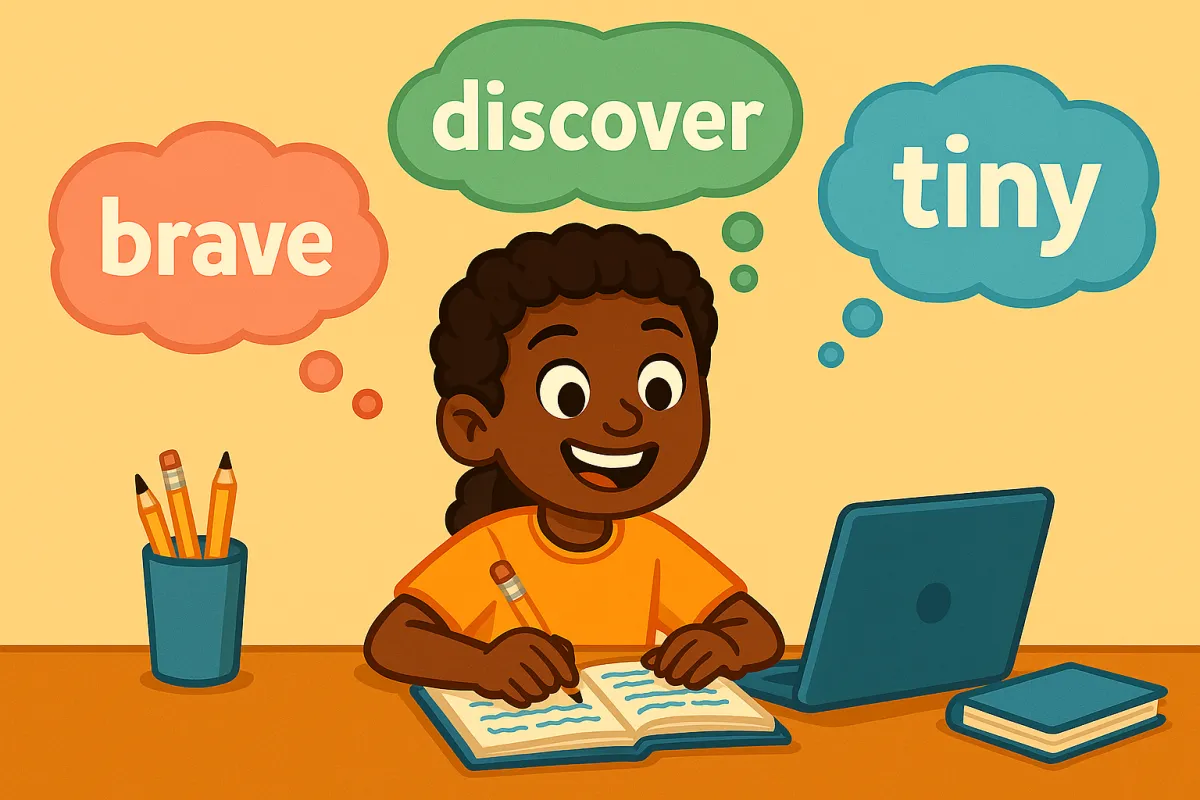
Daily Writing Prompts to Build Vocabulary and Confidence
Because Strong Writers Start with Small Steps
Last week, my 4th grader looked at a blank page and declared, "I don't know what to write about!" Sound familiar? I watched her stare at that paper for ten minutes before finally scribbling, "My cat is orange." That's it. One sentence. But here's what I realized: she wasn't stuck because she couldn't write—she was stuck because she didn't know how to begin.
As an engineering teacher who's guided hundreds of students through technical writing, lab reports, and creative projects, I've learned something crucial: confidence in writing doesn't come from perfection. It comes from practice. And the best practice? Daily writing prompts that meet kids exactly where they are.
The magic isn't in the prompt itself—it's in the routine. When children write every day, even for just 10 minutes, they build vocabulary naturally, develop their voice, and most importantly, stop seeing writing as this intimidating mountain to climb.
🧠 Why Daily Writing Prompts Work
They Remove the Blank Page Fear
The hardest part of writing isn't the writing—it's starting. Prompts give kids a launching pad, removing that paralyzing "I don't know what to write" moment.
They Build Vocabulary Organically
When kids write about different topics daily, they naturally reach for new words. A prompt about space exploration introduces "orbit" and "asteroid." A friendship prompt brings out "loyalty" and "trust."
They Create Safe Practice Space
Daily prompts aren't graded assignments—they're thinking time. Kids can experiment, make mistakes, and find their voice without pressure.
✍️ Age-Appropriate Prompts That Actually Work
Ages 6-8: Simple Starters
"If I could have any superpower, it would be..."
"The best thing about today was..."
"My favorite place to hide is..."
Ages 9-11: Building Complexity
"Describe your perfect invention and how it would help people."
"Write about a time you felt proud of yourself."
"If you could interview any historical figure, who would it be and why?"
Ages 12+: Critical Thinking
"Should students be allowed to grade their teachers? Explain your reasoning."
"Describe a world where everyone could read minds."
"What's one skill you think every teenager should learn before graduating?"
Anecdote: One of my students, a quiet 5th grader who rarely spoke in class, wrote this incredible piece about designing a robot that could help elderly people. His vocabulary jumped from simple sentences to using words like "innovative," "assistance," and "technology." That prompt unlocked something in him—and his confidence soared.
📈 How to Make Daily Writing Stick
Start Small
Ten minutes. That's it. Don't aim for novels—aim for consistency.
Make It Routine
Same time, same place. Maybe it's right after breakfast or before bedtime. Routine removes decision fatigue.
Focus on Ideas, Not Perfection
Grammar matters, but not on day one. Let kids get their thoughts flowing first.
Share (When They Want To)
Some kids love reading their work aloud. Others prefer privacy. Honor both.
🎯 Vocabulary Building That Doesn't Feel Forced
The best vocabulary building happens when kids don't realize it's happening. Here's how:
Word Banks: Before writing, brainstorm 5-10 words related to the prompt topic.
Synonym Challenges: "Instead of 'good,' what other words could you use?"
Story Starters with Rich Language: "The mysterious package arrived on a fog-shrouded morning..."
Parent Tip: Keep a family vocabulary journal. When someone uses an interesting word during writing time, add it to the list. Kids love seeing their "word collection" grow.
🚀 Real Results from Real Families
After three months of daily prompts, here's what parents typically notice:
Kids stop saying "I don't know what to write"
Vocabulary in everyday conversation expands
Writing assignments at school feel less overwhelming
Creative thinking improves across subjects
The goal isn't to raise the next Shakespeare—it's to raise confident communicators who can express their ideas clearly and creatively.
Final Thought from a Teacher Who's Seen the Transformation
Writing confidence isn't built in a day, but it is built daily. Every prompt completed, every word chosen, every idea expressed adds another brick to that foundation.
At Skhillz Academy, we weave writing throughout our STREAM curriculum—not as an isolated subject, but as a tool for thinking, creating, and communicating in every discipline. Because whether kids are explaining a science experiment or designing an engineering solution, strong writing skills unlock every door.
✨ Want more hands-on learning strategies that build real-world skills?
→ Explore our programs at Skhillz Academy
Let's build writers, thinkers, and confident communicators.
Skhillz Academy: STREAM Learning That Grows With Your Child
At Skhillz Academy, we offer a vibrant, flexible, and hands-on K–12 online learning experience built to nurture creativity, critical thinking, and future-ready skills—wherever your family is in the world.
We proudly support students in the U.S. and internationally through the following programs:
🎓 Online Kindergarten Discovery Program
📚 Online Elementary Academy (Grades 1–5)
🧠 Online Middle School Experience (Grades 6–8)
🚀 High School Launchpad (Grades 9–12)
✝️ Christian-Based & Secular Homeschool Curriculum Options
💡 STREAM-Focused Learning in Science, Tech, Reading, Engineering, ELA, Art & Math
🎓 Advanced & Enrichment Tracks for College and Career Readiness
Every program is flexible, accredited, and led by passionate educators who support each learner's journey at their own pace, while delivering engaging, real-world curriculum and project-based learning.
📞 Have Questions About Online Learning?
We'd love to help you find the right fit for your child's needs. Our team is ready to answer your questions about enrollment, curriculum, or how Skhillz can support your family's goals.
Call us: (888) 425-5094
Email: [email protected]
Submit an inquiry: https://skhillzacademy.org/contact-us
Let's build brilliance—one Skhillz Scholar at a time.
